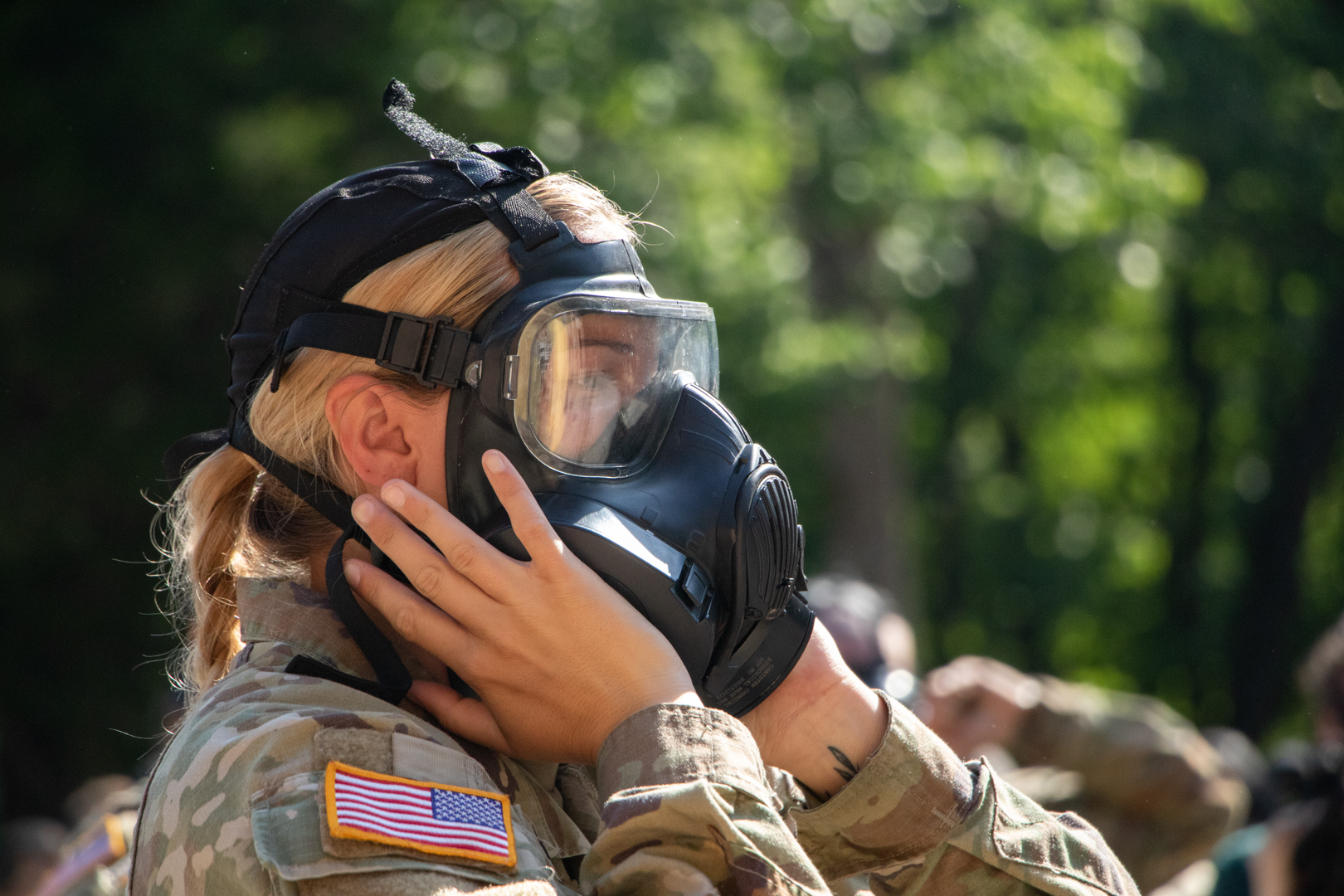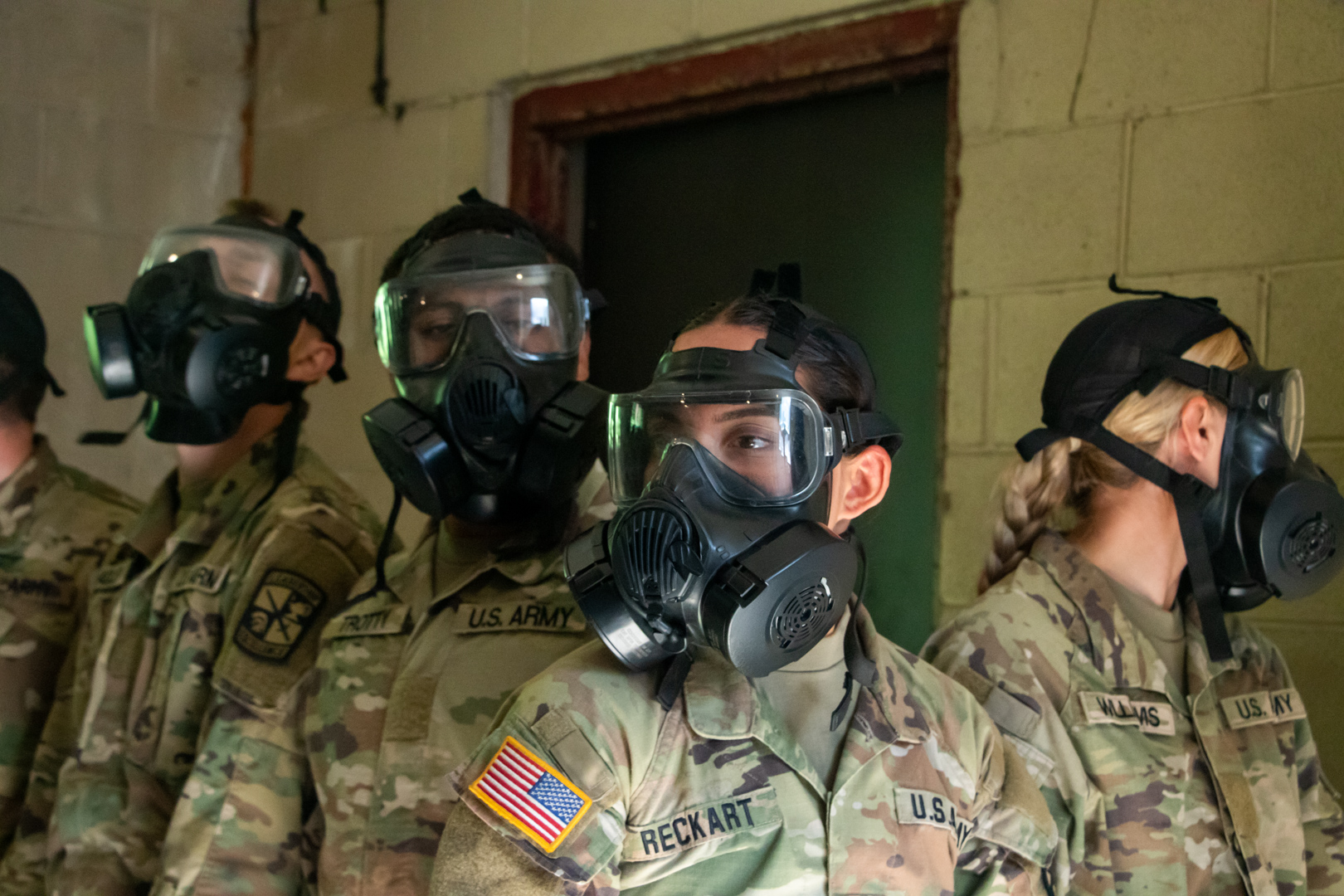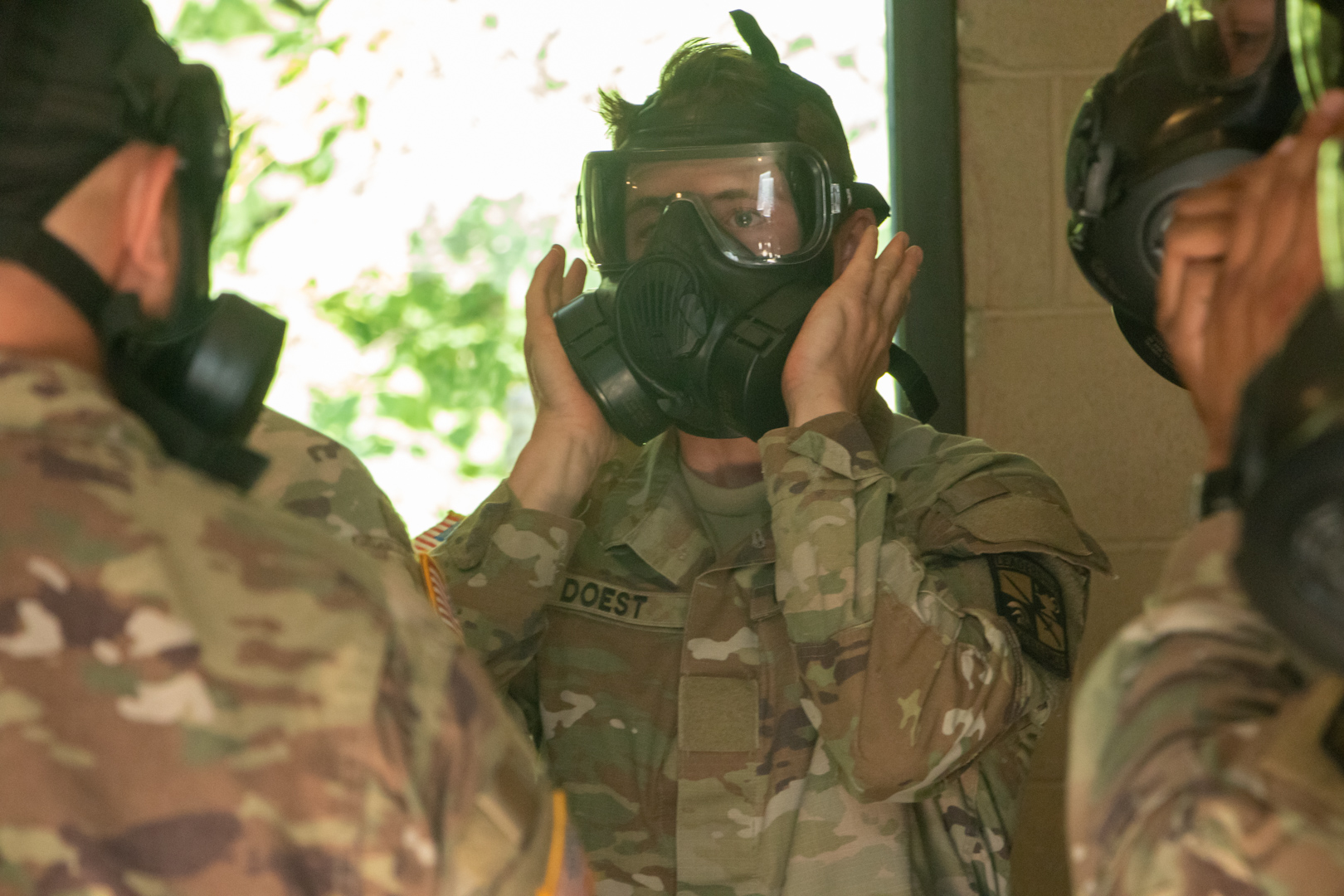FORT KNOX, Ky., – U.S. Army 1st Regiment, Advanced Camp, Cadets participated in the chemical, biological, radiological and nuclear chamber at Fort Knox, Ky., June 14, 2023. The Cadets go through gas chamber training to learn how to properly put on their gas masks and to do so in the correct timeframe. The training helps to prepare them for a possible enemy attack in combat.

Cadet Serena Williams, Minnesota State University, Mankato, has been through a CBRN chamber before. Williams went though basic training in 2021 and is a part of the Minnesota State National Guard.
“I was excited. I’ve done it before,” Williams said. “When I first did it, obviously I was scared, but it was a fear I overcame. So, whenever you overcome a fear, it’s almost exciting to do it again.”
Williams credits her grandfather for leading her down the path towards the Army. During her junior year of high school, her grandfather was diagnosed with stage five lung cancer.
“I spent a lot of time with my grandpa,” Williams said. “My grandpa was like my best friend, my mentor.”
Williams’ grandfather retired from the Army as a staff sergeant. He was stationed in Fayetteville, N.C., and was part of an airborne unit. His goal was to stay in the Army for life, but he was unable to due to his medical condition.
When it came to finding her career path, her grandfather knew she wanted to be an investigator; that is Williams’ end goal for her career. Her grandfather knew the Army could help lead her there.
“He always just wanted somebody [in the family] to carry it on,” Williams said. “At first, I was like, ‘well, I’m not going to join the military. I can’t do that. I’m tiny.’”
Her plans changed once her grandfather passed away.
“It was after my grandfather passed away that I put in a lot of thought and consideration to not only myself, but also my future,” Williams said. “If I want to get where I want to be, how am I going to do it? Am I going to do what my mentor told me to do, and go for it?”
So, one morning during her junior year of high school, Williams skipped school and walked into a recruiting office. Williams called her mother, and by the next day, she was at a military entrance processing station.
“I didn’t really know what I was doing,” Williams said. “But I knew that my path was set by somebody like, you know, my grandpa, he knows that this is right for me.”

After attending basic training, Williams decided she wanted to attend college. She started school at Minnesota State University, Mankato, where she learned about the MSU Reserve Officers’ Training Corps program.
“I wasn’t very hands on [at first] because I didn’t know that you had to contract. I didn’t know anything really about ROTC,” Williams said. “I just showed up to physical training. Then, about a half a year in, I found out more about it, and I contracted just this last school year.”
Williams has learned a lot within this last year at her ROTC program, and she is ready to grow as a leader.
“I’m here to promote myself as an Army leader,” Williams said. “I want to be successful in my military career, so that I can be successful on my civilian side. So, I’m really just trying to not only improve myself in this career, but also, overall, as a person.”
Cadet Jacob Doest, Grand Canyon University, had felt a calling to pastoral ministry since his sophomore year of high school, but it wasn’t until he, also, had a series of conversations with his grandfather that he felt lead to join the military.
“My grandfather was in the Navy in Vietnam. I really got to know just the sheer need for pastoral and emotional care in the military, not only for the Soldiers, Sailors, Marines, but also for their families,” Doest said. “So, after lots of prayer and consideration, I realized that is where God wanted me.”
Doest plans to branch chaplain, but he hit a roadblock. Doest originally enlisted in the Navy after high school in 2020, but COVID-19 changed that. His contract was terminated two weeks before he was set to leave for basic training.

“I felt devastated,” Doest said. “So, I turn to prayer, and I just really questioned God. ‘Where do you want me?’ I was really unsure, but he made it very clear.”
Through Doest’s Navy recruiters, Doest got in contact with the Grand Canyon University Army ROTC program. Doest was accepted into the program but was unsure how he was going to be able to afford college.
“Sure enough, I got a call from a gentleman who handles scholarships over at Arizona State University, which is the sister school to GCU,” Doest said. “He said, ‘hey, we have six total scholarships nationally that the Army gives to ASU and GCU every year. The sixth person did not want their national scholarship.’”
Doest had only been in the program for a few days, but he decided to go and interview for the scholarship.
“Sure enough, I did the interview, got the full ride, and haven’t had to pay for school,” Doest said. “For me, that was a huge affirmation. I’ve kept seeing those affirmations. Not only being here at CST [Cadet Summer Training], but also through air assault school when I went there last year. Just all the ways that God has been preparing me and working me to lead in the chaplaincy.”
Doest has one more year of college until he can commission but will have an educational delay to complete his master’s in divinity. The divinity master program is a 75-credit program that will train its students on the Bible, as well as, how to be a chaplain.
“I will do that for about three to four years and then, two years of ecclesiastical endorsement, which is where, after working a church full time, per the Army standards, and if the endorsing agents that I’m working with say I’m good to go, I’ll be a full-time chaplain,” Doest said. “But up until that point, for the first six years, I’ll be in the Reserves as a chaplain candidate shadowing a chaplain. [I’ll] essentially do that civilian pastoral job at the same time.”
The grandfathers of Williams and Doest led to their entrance into the U.S. Army, preparing them for endless opportunities. They look to successfully complete CST and to continue their path in honoring their families.




